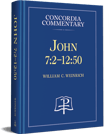Having just passed my fiftieth birthday, I am well into adulthood. I noticed several years ago that I not only look but also behave like my father. My hands are an excellent example. The shape of my fingers resembles his, as do my fingernails and wrinkles. Even more interesting is that when driving, I place my hands on the steering wheel in the same places he did. This happened naturally since he was deceased before I learned to drive. There are a myriad of other examples in both appearance and behavior. The point is that beyond my birth certificate, there is evidence that I am my father’s son. Jesus’ connection to the Father is of paramount importance in the Gospel reading. Convincing His disciples of this connection is one of our Savior’s goals in John 14:1–14. The other is that although He is leaving, He will return. And what is more, He will not leave them alone. In the chapters leading up to the Gospel reading, Jesus has entered Jerusalem, predicted His death, washed the feet of the disciples, predicted the betrayal of Judas and the denial of Peter, and given the disciples His command to love one another. Now He speaks words of comfort.
A Look at the Greek
In verse 2, Jesus explains that there are many rooms in His Father’s house. The Greek word for rooms, μοναί, can also be translated “dwelling places.” “Dwelling places” has a more impactful meaning. It conveys a sense of permanence. When Jesus returns to take the disciples and all believers to heaven, they will dwell with the Father and the Son eternally. While the Son will be visibly absent for only a little while until His return, their place in paradise will have no end.
In verse 6, Jesus states that no one comes to the Father except through Him. The Greek word for through, διά, can also be translated “on account of” or “by reason of.” These two alternate translations make sense when we consider that there is access to the Father only because of Jesus’ perfect life, innocent death, and resurrection. Without Christ, the doors of heaven are closed. Through faith in what Christ has done, there is forgiveness and acceptance.
I and the Father Are One
For Jews, reaching the Father was of utmost importance. Jesus wants to convince His disciples that not only is it through Him that they will reach the Father, but that to have the Son is to have the Father also. Jesus charges in verse 1, “Let not your hearts be troubled. Believe in God; believe also in Me.” These two injunctions are related. Their hearts are not to be troubled. Why? Because to know the Son is to know the Father. By saying, “Believe in God; believe also in Me,” Jesus is saying He is God. Even after watching Him teach, fulfill prophecies, and perform miracles for three years, some of the disciples struggle with the truth that Jesus is God. He wants them to understand that if believing in God brings comfort, believing in Him can bring the same comfort since He is God.
After promising that the disciples not only have a place in heaven but that He will come again to take them there, Jesus asserts in verse 4, “You know the way to where I am going.” I would suggest that when Jesus says “you know,” He is referring not so much to awareness or understanding but to acquaintance. They know the way as a Friend, Teacher, Prophet, Miracle Worker, and soon-to-be Savior. Thanks to the work of the Holy Spirit, Christians not only know Jesus as the way for who He is but also for what He has done. Jesus is our way to heaven in that He is the sacrifice for our sins, our risen Lord, and our advocate before the Father.
I Am the Way, and the Truth, and the Life
Jesus follows with what is perhaps the most controversial verse in the Bible: “Jesus said to him, ‘I am the way, and the truth, and the life. No one comes to the Father except through Me” (v. 6). Christ wants the disciples, and us, to understand that He is not merely a way to the Father but the way—the only way. While John 3:16 assures us that Jesus died for everyone and that in this manner Christianity is inclusive, John 14:6 demonstrates that Christianity is also exclusive in the sense that there is full forgiveness and eternal life, but only through faith in Jesus Christ.
Philip, with a heart truly slow to believe, asks Jesus to show them the Father. Our Savior responds in verse 10: “Do you not believe that I am in the Father and the Father is in Me?” This question clarifies beyond all doubt what Jesus is trying to convey. To have the Son is to have the Father. Jesus doesn’t need to show them the Father because since they have seen Jesus, they have also seen the Father.
I Am Going to the Father
Jesus communicates that He is going away, but He will also return. Jesus must go away for two reasons. First, if He does not go to the cross, there will be no rooms in heaven. In fact, there can be no access to heaven. Second, if the Son does not ascend into heaven, the Counselor, the Holy Spirit, cannot come.
We are comforted to know the rest of the story. Jesus rises, ascends, and the Counselor has come. Jesus has “returned” in the Word and Sacraments, giving us Himself for the creation of faith and forgiveness of sins. One day, He will return and take us to our dwelling places.
Scripture: ESV®.

John 7:2–12:50 in the Concordia Commentary series exposes essential imagery, significant narrative devices, and historical context in the Gospel of John.
























